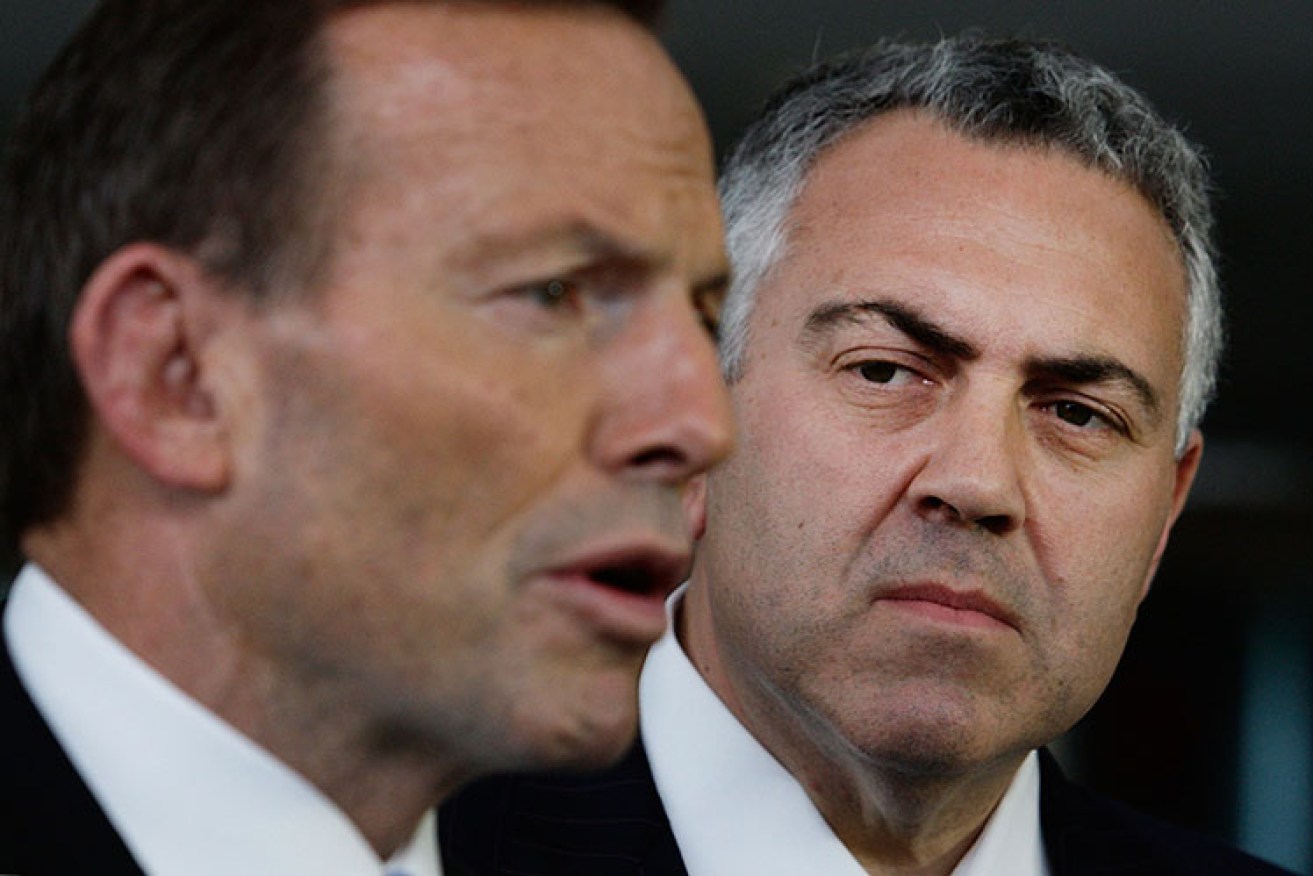Will Abbott listen?


AAP
“The cocktail party effect” is the sexy quasiscientific name for that brilliant ability we all have to ignore the clatter of dancing heels on polished floorboards, the tinkling of ice cubes in martini glasses and the blathering of dullards across the room while somehow catching every word of the fascinating person actually talking to us.
It’s the reason we can hear our name being uttered by complete strangers in a conversation several metres away, despite being immersed in distractions of our own. In short, it’s what allows us to tune in to what we deem important, while blocking out all the stimuli we don’t care about.
For a new Prime Minister, life is a little like the most nightmarish cocktail party one could conjure. You turn up, ready for a good time, then suddenly someone turns the music up. A second later, everyone at the party starts yelling at you. Then that rug you didn’t even realise you’d been standing on gets whisked away from under you. And yet somewhere at the party, you’re sure, someone is saying something of worth, advice you really should be listening to: you just need to figure out who.
Prime Ministers who master this art survive. Prime Ministers who don’t die painful political deaths.
Learning which of these voices to listen to — and which to tune out — is essential.
It’s entirely understandable that most new PM’s aren’t very good at this. In fact, it’s entirely understandable that most new PM’s aren’t very good full stop. A fact often overlooked in discussions about our national leaders is that it’s a job just like any other. In other words, when you first get the gig, you have no earthly idea what you’re doing. You try to look the part — and you hope desperately that, over time, looking the part will translate into actually being the part. The first six months (or longer) of a government’s first term is usually littered with errors, as the new boss realises that watching someone do the job hasn’t taught him or her how to actually do the job.
As the mistakes mount, and the press inevitably accuses you of lacking a narrative (trust me, it happens to everyone), you are barraged by a cacophony of voices offering free advice. Many of these voices are in the media. Some come from your staff. Some might even come from your family. Ministers and backbenchers will throw a few words your way, though more often with regards to specific policy areas rather than your overall approach — they don’t want to be seen overstepping their marks too early. Public servants will weigh in as well, and of course there are your political “mates”, the people you have collected over the years and now flood back like dirty bathwater to a drain. Then there’s your own moral compass, your political calculator and your policy whiteboard — all useful tools, but often difficult to reconcile with each other.
And of course there are the voters themselves, with all their diverse concerns and opinions.
Learning which of these voices to listen to — and which to tune out — is essential. The tricky thing is that there is no clear formula. There are, however, some basic rules.

Close confidantes … Prime Minister Tony Abbott (left) and Treasurer Joe Hockey.
The first is to surround yourself with a few people willing to tell you you’re wrong, even after you’ve made up your mind. This is easier said than done when you’re PM — the tendency of people to agree with someone in high office is a powerful force. Second, you need to make sure you listen to people from different spheres, so that you don’t become captured by group-think — only listen to your staffers, or journalists, or Ministers, and you’ll quickly run aground. But even with these rules in mind, it’s a difficult task, and one you won’t always get right. Sometimes your wise men and women make dumb mistakes. Sometimes the jester shows unexpected wisdom.
The level of difficulty for Tony Abbott is increased by the fact that he became a very successful Opposition Leader precisely by refusing to listen to a diverse array of voices. At many points in the past few years he was told to abandon his strategy of unflinching negativity, to put policy on the table and argue for an alternative vision of Australia. He and his office stood firm and ignored these pleas — to their credit. Had he faced a different government, one not torn apart by division and offering ideas of their own at the 2013 election, he may have been forced to change his tactics. But he didn’t, and he wasn’t, and he therefore won a convincing election victory on very little other than pledging to tear down everything the other mob stood for, a gameplan he pursued relentlessly for four years.
Since he came to power, there have been signs of Abbott’s continuing refusal to listen to anyone who doubts his decisions. And in some ways, fair enough — that approach paid dividends for a long time. But as many commentators have noted over recent weeks, government is very different from opposition.
This reality now appears to be dawning on the government. The past few weeks have seen hints of change. It is possible to discern the fact that, very slowly, Tony Abbott is honing his use of the cocktail party effect and learning to listen selectively and well.

Australia’s Prime Minister Tony Abbott and wife Margaret Aitken with Indonesia’s President Susilo Bambang Yudhoyono and his wife Ani Yudhoyono in October.
First up was Indonesia. It’s fair to say Abbott began badly: aggressively refusing to apologise for bugging the Indonesian President in the absence of an Indonesian request for any such thing was a clear attempt to play domestic politics. But quickly he righted himself, quietly penning a letter to SBY and taking a much calmer approach to the issue. Someone had told him playing domestic politics on foreign policy was bound to backfire, and he had got the message.
This Monday we got the schools about-face. This was a hugely embarrassing moment both for Abbott and his Education Minister Christopher Pyne. Both had been doggedly insisting black was white for days, and to suddenly reverse their position meant not so much ending up with egg on their faces as a fully fledged omelette. Nevertheless, serious commentators as well as popular NSW Premier Barry O’Farrell were criticising Abbott and Pyne on both substantive and political grounds, and Abbott had decided to listen.
There have also been suggestions in some parts of the press that Abbott intends to abandon his government’s hide-and-seek media strategy. Rightly so. Not acquiescing to every whim of the media makes good political sense — giving press conferences because the press wants them isn’t always the right call. But point blank ignoring forensic criticism from Laurie Oakes because Scott Morrison has his own ideas on media tactics is like ignoring the brilliant conversationalist who wants a quiet word in favour of the opinionated drunk in the corner — very poor cocktail party management.
All of this is not to say that Abbott should bend in the face of every criticism. Far from it. This is part of the challenge: treading the fine line that separates sensible political compromise from lack of courage in the face of adversity. Often it is not possible until the election results are in to tell which side of the line you’ve fallen down on. It’s clear now that John Howard was right to stand his ground on gun control, right to backtrack on the petrol excise, and wrong to stay stubborn on WorkChoices. Some might say that is a cynical political judgment, validating decisions by their political outcomes. Well, yes, in part, but only in part – politics is the art of the possible, after all, and winning elections is what allows you to continue to chase your goals. For a decade Howard did a good job of deciding when to listen and when to trudge onwards. When that judgment deserted him, so did the electorate.
It’s still early. We know very little about what sort of a Prime Minister Tony Abbott will be. But within a year or two we will have a very good idea indeed, and the electorate will have made some judgments that will be very hard to reverse. Whether Abbott has managed by then to tune out the sillier voices around him – not just after he’s made initial mistakes, as has been the case so far, but before he missteps in the first place – will play a big role in what those judgments look like.
Sean Kelly was an adviser to Kevin Rudd from 2009 then to Julia Gillard from 2010. He is on twitter @mrseankelly








